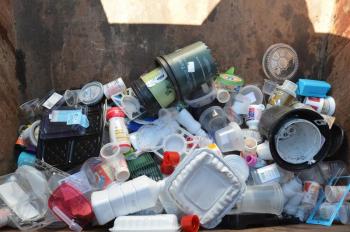Changing international markets result in new Midcoast plastic disposal trends
ROCKPORT — Because residents of Camden, Hope, Lincolnville and Rockport want to recycle their trash, but because the market demand for plastic has diminished, and because plastic is ubiquitous, there is now different sorting practice at the Midcoast Solid Waste Corp. Transfer Station on Rockport. It went into effect Oct. 17, and staff members at the transfer station are asking residents to carefully separate their plastic into the right bins.
The new system is to separate the No. 1 plastic bottles and containers from the No. 3 through 7 plastic receptacles. That way, the No. 1 plastic (PET), which can still generate revenue in today’s market, can be kept apart from the plastic that has a more negligible return, if even a return at all.
Hong Kong/China is not buying scrap plastic from the U.S. as it did in 2016, when it took 69 percent of U.S. scrap plastic exports, according to an article on Resource Recycling. Meanwhile, the U.S. does not have enough materials recovery facilities — the recycling infrastructure — to handle its own plastic waste, said Resource Recycling.
That means that local transfer stations across the U.S. are confronted with hills of plastic, and an unstable recycling market.
“Please note that these changes allow us adaptability as we work with a changing market for recyclables that can shift daily,” said a memo from Midcoast Solid Waste, to its taxpayers.
At the transfer station, bins are clearly marked and at the front-end of the recycling line. This requires, however, that residents check their plastic trash for individual recyclable number, stamped on the bottom.
And, the facility warns: The 3-7 mix excludes all bags, film, flexible packaging and Styrofoam.
Going forward, all No. 1 plastic is to be tossed into its own bin, while the 3-7 plastic will go into another generalized bin.
And, the No. 2 plastic — those opaque milk and juice jugs — will continue to be collected in its own larger bin. And the colored No. 2 plastic, such as laundry detergent bottles, will continued to be collected in the larger green bin.
The reason for this new practice based on:
1) The recycling market is not demanding plastics rated No. 3-7, but it is still buying No. 1 plastic.
2) It is still cheaper to recycle the plastic than to dump it into the trash bins that are destined to the PERC incinerator in Orrington.
3) The Rockport transfer station, which is owned by the four towns, is due to end its business with PERC, per voter approval, and begin working with the Scarborough-based ecomaine, itself a waste facility that is owned by 20 municipalities.
Current market pricing, which is subject to change, to move the # 3 through #7 to Portland for recycling is $10 per ton, plus trucking fees, to be paid by MCSWC. The No. 1 plastic, when sorted separately, is currently costing $130 per ton, plus trucking fees, according to the transfer station.
These prices are subject to change. A mixed trailer load to Portland would weigh approximately 18-19 tons. MCSWC hopes to have a minimum split load of 33 percent No. 1 and 6 percent No. 3-7 when the plastic is transported. This weight is accomplished two to three times a year historically with the plastic being stored until the tonnage is met.
"ecomaine is helping us fulfill our goal to recycle over a waste to energy option," said Beth Kwiatkowski, who works in the office at the transfer station. "They are willing to work with us because we are contracted to begin sending our MSW to them in April, 2018. ecomaine diligently works toward recycling options before moving products to the waste to energy level of the waste hierarchy pyramid."
The recycling goals of Maine rest on a premise that residents are to reduce, reuse, recycle and compost before sending trash to waste-to-energy facility, like PERC, or into a landfill.
Midcoast Solid Waste has been assured that the plastic that is sent from Rockport will remain baled and forwarded for recycling, whether it is purchased or Midcoast Solid Waste pays a fee to move it forward into the market, said Kwiatkowski.
The breakdown
No. 1 plastic
Polyethylene terephthalate (PET, PETE) plastic is generally smooth, clear, tough and is a resin used in beverage bottles, food jars, microwavable food trays, salad dressing, etc. It is recycled into fleece jackets, comforter fill, bottles and strapping.
No. 2 plastic
High Density Polyethylene (HDPE) plastic is translucent, stiff, and used for milk, shampoo, lining cereal boxes, and in grocery bags. It is generally recycled into new bottles for shampoo, antifreeze, plastic lumber, floor tiles, flower pots and recycling bins.
No. 3 plastic
Polyvinyl Chloride (PVC, vinyl) is strong, clear and used for blister packing, deli and meat wrap, medical wrapping and is tamper resistant. It is recycled into pipe, decking, flooring, traffic cones, garden hose and mobile home skirting.
No. 4 plastic
Low density polyethylene is transparent and used for newspaper bags, hot and cold drink cups, toys, squeezable bottles. It is recycled into garbage bag liners, compost bins and outdoor lumber.
No. 5 plastic
Polypropylene is used in stretch and blow-molded containers like medicine bottles, yogurt containers, takeout meat. It is recycled into automobile parts, like battery cases, bike racks, ice scrapers and garden rakes.
No. 6 plastic
Polystyrene is rigid or foam, and often combined with rubber. It is used for cups, plates, and is the foam packing peanuts. It can be recycled to insulation, light plate switches, plastic molding and egg shell cartons.
No. 7 plastic
This is “Other” plastic is made with a resin other than the above-mentioned. It is used in water bottles, citrus containers, oven-baking bags. It is recycled into plastic lumber and bottles.
Reach Lynda Clancy at lyndaclancy@penbaypilot.com; 207-706-6657


























